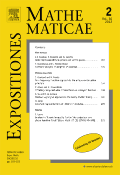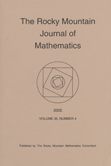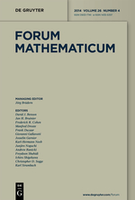
European Journal of Mathematics
Scope & Guideline
Your Gateway to High-Quality Mathematical Research
Introduction
Aims and Scopes
- Algebra and Number Theory:
Research in this area includes studies on algebraic structures such as rings, modules, and algebras, along with number theory topics including prime ideals and algebraic number theory. - Geometry and Topology:
The journal features papers exploring geometric structures, including differential geometry, algebraic geometry, and topology, focusing on the properties and applications of various geometric entities. - Analysis and Functional Analysis:
Papers in this section cover real and complex analysis, functional analysis, and operator theory, emphasizing the theoretical underpinnings and applications of analytical methods. - Applied Mathematics and Computational Methods:
This area encompasses numerical methods, mathematical modeling, and computational techniques applied to real-world problems across various scientific and engineering disciplines. - Graph Theory and Combinatorics:
Research involving properties and applications of graphs, combinatorial structures, and their mathematical implications is a significant focus of the journal. - Differential Equations and Dynamical Systems:
The journal includes studies on ordinary and partial differential equations, dynamical systems, and their qualitative and quantitative analyses. - Mathematical Physics and Interdisciplinary Applications:
Papers exploring the intersection of mathematics with physics and other disciplines, providing mathematical insights into physical phenomena and interdisciplinary applications.
Trending and Emerging
- Interdisciplinary Applications of Mathematics:
There is a growing trend of papers exploring the application of mathematical theories and methods to fields such as biology, economics, and engineering, indicating a shift towards interdisciplinary research. - Advanced Computational Techniques:
The journal has seen an increase in publications focused on advanced computational methods, including machine learning and numerical simulations, reflecting the integration of computer science with mathematics. - Nonlinear Dynamics and Chaos Theory:
Research in nonlinear dynamics and chaos theory is on the rise, highlighting an increased interest in understanding complex systems and their behaviors. - Fractional Calculus and Applications:
The emergence of fractional calculus as a significant area of study is evident, with more papers dedicated to its applications in various fields, including physics and engineering. - Mathematical Modeling of Real-World Problems:
There is a notable increase in research that emphasizes mathematical modeling to address real-world issues, particularly in health sciences, environmental studies, and economic forecasting. - Algebraic Structures with Applications:
Emerging research on specialized algebraic structures, such as superalgebras and hom-algebras, suggests a trend towards exploring their applications in theoretical and applied contexts.
Declining or Waning
- Classical Analysis Techniques:
There has been a decline in the number of publications focused on classical analysis techniques such as elementary methods in real analysis, suggesting a shift towards more modern and abstract approaches. - Elementary Number Theory:
Research papers that delve into elementary number theory topics have become less frequent, possibly due to a growing emphasis on more complex algebraic structures and computational methods. - Basic Graph Theory:
While graph theory remains a vital field, basic studies on simple graph properties and structures are declining, indicating a shift towards more advanced topics or applications in graph theory. - Traditional Combinatorial Techniques:
The journal has seen fewer papers utilizing traditional combinatorial methods, as researchers increasingly adopt probabilistic and geometric approaches. - Standard Algebraic Structures:
Research on standard algebraic structures, such as basic group theory, is less frequently featured, possibly reflecting a move towards more specialized or applied algebraic research.
Similar Journals

EXPOSITIONES MATHEMATICAE
Connecting Scholars Through Mathematical InsightsEXPOSITIONES MATHEMATICAE, published by Elsevier GmbH, stands as a significant journal in the realm of mathematics, catering primarily to researchers, professionals, and students. With an ISSN of 0723-0869 and an E-ISSN of 1878-0792, this journal has made its mark in the academic community, boasting a Q2 classification in the miscellaneous mathematics category for 2023, illustrating its prominence within its field. The journal addresses a diverse scope of mathematical topics, encouraging the publication of original research and innovative theories while maintaining rigorous academic standards. As it converges from 2004 to 2024, EXPOSITIONES MATHEMATICAE continues to be an essential resource for advancing mathematical knowledge and fostering scholarly communication, despite being a non-open-access publication. Its location in Munich, Germany further anchors it within a rich intellectual tradition, providing accessibility for the mathematical community worldwide.

Forum of Mathematics Sigma
Empowering the mathematical community with impactful insights.Forum of Mathematics Sigma is a premier open access journal published by Cambridge University Press that has been at the forefront of mathematical research since its inception in 2013. With a strong emphasis on advancing the fields of mathematics, the journal consistently achieves Q1 rankings across multiple categories, including Algebra and Number Theory, Analysis, and Computational Mathematics. This distinction highlights its impact and relevance within the scholarly community. The journal prides itself on providing a platform for innovative research, fostering collaboration among researchers and practitioners across various mathematical disciplines. Open access publication ensures that cutting-edge findings are widely available to readers globally, enhancing the dissemination of knowledge. With an address in the heart of Cambridge, England, Forum of Mathematics Sigma is dedicated to promoting high-quality research and making significant contributions to the development of mathematics.

ROCKY MOUNTAIN JOURNAL OF MATHEMATICS
Bridging Disciplines, Advancing KnowledgeROCKY MOUNTAIN JOURNAL OF MATHEMATICS, published by the Rocky Mountain Math Consortium, serves as a critical platform for researchers and practitioners in the field of mathematics since its inception in 1971. With a notable presence in the academic community, this journal covers a broad spectrum of mathematical disciplines, positioning itself in the Q2 category for Mathematics (miscellaneous) as of 2023. Despite being a subscription-based journal, it is recognized for its rigorous peer-review process and contributions to theoretical and applied mathematics, helping to advance knowledge and foster collaboration among mathematicians. The journal's ISSN number is 0035-7596 and its E-ISSN is 1945-3795, reflecting its commitment to accessibility and dissemination of high-quality research. Based in Tempe, Arizona, at Arizona State University, the journal continues to play an important role in shaping contemporary mathematical discourse through well-researched articles and innovative studies, aiming to bridge gaps between various mathematical subfields and engage a diverse audience, including students and established researchers alike.

JOURNAL OF THE KOREAN MATHEMATICAL SOCIETY
Connecting scholars through groundbreaking research.JOURNAL OF THE KOREAN MATHEMATICAL SOCIETY is a premier academic publication dedicated to advancing the field of mathematics through rigorous research and scholarly discourse. Published by the esteemed Korean Mathematical Society, this journal provides a platform for mathematicians and researchers to disseminate their findings, engage in innovative ideas, and connect with the global mathematical community. With an ISSN of 0304-9914 and E-ISSN 2234-3008, the journal has established itself as an important resource in the mathematical landscape, currently holding a Q3 classification in the ‘Mathematics (miscellaneous)’ category as per the 2023 rankings. Though not open access, the journal is committed to promoting high-quality contributions that span various mathematical disciplines, making it indispensable for students, researchers, and professionals alike. Operating from its base in Seoul, South Korea, it contributes to the international mathematics community by publishing cutting-edge research from 1997 to 2024 and beyond, facilitating an avenue for knowledge sharing and innovation in mathematics.

Hacettepe Journal of Mathematics and Statistics
Fostering Innovation in Algebra, Geometry, and BeyondHacettepe Journal of Mathematics and Statistics, published by Hacettepe University in Turkey, is a vital platform for scholars in the fields of mathematics and statistics. With a commitment to promoting rigorous research, this journal covers a diverse range of topics including Algebra and Number Theory, Analysis, Geometry and Topology, and Statistics and Probability. Since its inception in 2008 and looking forward to its continued convergence up until 2024, it has established itself as a resource for both theoretical and applied mathematics. Although it currently holds a Q4 ranking in Algebra and Number Theory and Q3 in multiple other categories, its commitment to quality research is evident through its Scopus rankings, positioning it favorably among its peers. The journal operates on an open access model, facilitating wide dissemination of knowledge, and is particularly appealing to researchers, professionals, and students aiming to stay at the forefront of mathematical sciences. With an E-ISSN of 2651-477X, the Hacettepe Journal of Mathematics and Statistics aspires to foster collaboration and innovation in the mathematical community.

Rendiconti del Circolo Matematico di Palermo
Cultivating Mathematical Excellence Since 1887.Rendiconti del Circolo Matematico di Palermo, published by SPRINGER-VERLAG ITALIA SRL, is a revered journal in the field of mathematics, emphasizing the cultivation and dissemination of mathematical knowledge since its inception in 1887. With its ISSN 0009-725X and E-ISSN 1973-4409, this esteemed publication has continued to thrive, showcasing innovative research, comprehensive reviews, and thoughtful discussions from diverse areas in mathematics, particularly in its Q2 ranking within the miscellaneous mathematics category. Its historical significance is underscored by its convergence of publications across numerous years, including its notable periods from 1887 to 1916, 1919 to 1938, and beyond, effectively capturing the evolution of mathematical thought. Though not open access, the journal remains an essential resource for researchers, professionals, and students aiming to stay updated with the latest advancements and methodologies in the ever-evolving landscape of mathematics. With its Scopus rank placing it in the top 25th percentile, Rendiconti del Circolo Matematico di Palermo continues to be a cornerstone for scholarly dialogue and development in its domain.

CANADIAN JOURNAL OF MATHEMATICS-JOURNAL CANADIEN DE MATHEMATIQUES
Connecting scholars through high-quality mathematical insights.Canadian Journal of Mathematics - Journal Canadien de Mathématiques is a prestigious peer-reviewed journal published by Cambridge University Press, which aims to advance the field of mathematics through the dissemination of high-quality research articles. With its ISSN 0008-414X and E-ISSN 1496-4279, the journal plays a pivotal role in fostering mathematical research and collaboration. It has been recognized for its impactful contributions, currently holding a category quartile ranking of Q2 in Mathematics (miscellaneous) for 2023 and sits in the 66th percentile among its peers according to Scopus rankings. As the journal continues its convergence from its inception in 1994 through to 2024, it remains a vital resource for researchers, professionals, and students seeking to stay at the forefront of mathematical developments. The journal does not operate under an open access model, allowing for a curated collection of articles that adhere to rigorous academic standards.

Analele Stiintifice ale Universitatii Ovidius Constanta-Seria Matematica
Empowering Researchers through Accessible Mathematical KnowledgeAnalele Stiintifice ale Universitatii Ovidius Constanta-Seria Matematica is a prominent open-access journal established by OVIDIUS UNIV PRESS in Romania, dedicated to advancing the fields of mathematics, specifically in Analysis and Applied Mathematics. Since its inception, the journal has emphasized the dissemination of high-quality research, making it accessible to a global audience. With an ISSN of 1224-1784 and E-ISSN 1844-0835, it has positioned itself within the academic community, achieving a respectable Q3 ranking in both analysis and applied mathematics in 2023, reflecting its commitment to rigorous scholarship. The journal spans a considerable publication window from 2009 to 2024, catering to the ongoing developments in mathematical sciences and their applications. Researchers, professionals, and students alike will find valuable insights and contributions that enrich their understanding and foster collaboration within the mathematical community. The journal's headquarters is based at the Faculty of Mathematics & Computer Science, Bulevardul Mamaia 124, Constanta, Romania.

Pure and Applied Mathematics Quarterly
Shaping the Future of Mathematics with Every IssuePure and Applied Mathematics Quarterly is a prestigious journal published by INT PRESS BOSTON, INC, focusing on the diverse and evolving field of mathematics. Since its inception in 2007, this journal has grown significantly, currently holding a Q1 ranking in the Mathematics (Miscellaneous) category for 2023, positioning it among the leading publications in the discipline. With a commitment to publishing high-quality research, Pure and Applied Mathematics Quarterly fosters innovation and dialogue within the mathematical community by providing a platform for theoretical advancements and practical applications. The journal remains accessible to researchers and professionals through its ISSN 1558-8599 and E-ISSN 1558-8602, although it does not currently offer open access. As a vital resource for mathematicians, educators, and students, this journal endeavors to expand the frontiers of mathematical knowledge and contribute to the academic dialogue surrounding this fundamental science.

FORUM MATHEMATICUM
Unraveling Complexities: Where Mathematics Meets InsightFORUM MATHEMATICUM, published by WALTER DE GRUYTER GMBH, is a distinguished academic journal based in Germany, known for its significant contributions to the field of mathematics. With an ISSN of 0933-7741 and an E-ISSN of 1435-5337, the journal features comprehensive studies ranging from applied mathematics to diverse mathematical disciplines. Having maintained a commendable presence since 1989, FORUM MATHEMATICUM has achieved notable classification rankings, including Q2 in Applied Mathematics and Q1 in miscellaneous Mathematics as of 2023. Additionally, it holds a Scopus rank within the top 60th percentile in General Mathematics, making it a prominent platform for researchers and professionals seeking rigorous analysis and innovative methodologies in mathematics. While the journal does not currently offer open access, its rich content is pivotal for advancing mathematical theory and applications, appealing to students and seasoned academics alike.